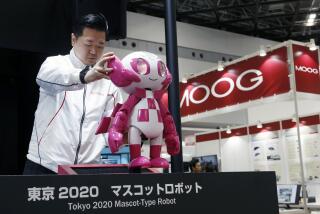Japan Counts on Coupons to Boost Economy
- Share via
NODA, Japan — The great handout has arrived.
After trying just about everything to get tight-fisted Japanese consumers spending again and the economy rolling, Japanese politicians announced a plan a few months back to start giving money away.
The $6.7-billion program kicked off Jan. 29 and, as might be expected, consumers are lining up in droves to pocket the windfall. Early concerns that status-conscious Japanese would be too ashamed to accept the $179 per person in shopping coupons, out of fear their neighbors might think them poor or desperate, have proved groundless. Even in Japan, free money is too good to pass up.
Hamada, a town in western Japan that was the first to open its cash register, saw nearly 20% of eligible recipients--limited to all children younger than 15 and most senior citizens--line up on the first day. The city of Noda, another early bird, has watched as 84% of those qualified picked up their coupons in a little over a week. All told, coupons will be distributed to 35 million Japanese.
In fact, a bigger concern appears to be the multitudes who now feel left out. A survey by NHK, Japan’s national broadcaster, found that 76.4% of respondents believe that more citizens should share the wealth.
Some of the near-eligible, meanwhile, appear to be taking matters into their own hands. “Young fathers come in with the coupons and say, ‘My kids gave these to me. Can I buy beer?’ ” said Etsuko Yokota, owner of the Hinoya Liquor Store in Noda, about 20 miles northeast of Tokyo. “They’re a bit embarrassed, but we let them.”
As befits any government program, particularly one giving away money, there are lots of complex rules to annoy taxpayers and shop owners. Coupons can be used to buy gold rings but not gold bars; for gambling on pachinko--Japan’s national pinball pastime--but not on horses or the lottery; for rent payments but not rental commissions paid to landlords.
Local officials charged with handing out the coupons admit some of the rules are so complicated that even they have trouble keeping them straight. It’s not enough to be a senior citizen. In addition, eligible seniors must be receiving a welfare pension, or have extreme mental or physical handicaps, or be exempt from local income tax.
Many senior citizens who don’t qualify badger government offices wondering why they’re being left out. “I’m living on minimum income but didn’t get any,” said 75-year-old Koichi Ozaki, a retired manufacturing company employee, standing in the cold outside a coupon distribution center. “It’s really unfair.”
A more fundamental question is whether this whole wacky experiment will work. Behind the plan is a hope that Japan’s overanxious savers will be so impressed by the largess that they’ll forget the nation’s record-high unemployment, mounting bankruptcies and economic gloom and spend away, stimulating the economy back to life.
Nice idea. Yet almost no one seems to believe that the monopoly money will stimulate much of anything. Economists are highly skeptical, as were 70% of the respondents surveyed by NHK.
One problem is that many coupons are being spent on food, school supplies and other essentials that consumers already planned to buy. By substituting coupons for cash, people draw less out of their bank accounts and essentially save the $179.
“I’d like the money. I’d buy a video game,” 11-year-old Hayato Yoshihara said. “But my mother says we’ve got to use them to buy my gym uniform.”
In addition, bureaucratic bean counters ended up reducing the plan’s size and scope to the point where objectives are unclear and the amount spent is hardly noticed. “Is this designed to help the economy or boost social welfare?” asked Fuminori Komata, a thrift-shop owner. “It’s all a bit vague.”
Noda, a small city with a rundown commercial district of slowly dying mom-and-pop stores, plans to distribute $4.7 million in coupons. At best, local officials figure, this might add 0.1% in new business. “That’s not much,” said Hiroyoshi Mogi, executive director of the Chamber of Commerce here.
Still, it’s better than nothing, say some battered retailers as they try to keep their spirits up after eight years of economic downturn. “We all wish the first spring wind will blow in on this very dark and gloomy economy and trigger some new vitality,” Mogi said.
Chiaki Kitada of The Times’ Tokyo Bureau contributed to this report.
More to Read
Sign up for Essential California
The most important California stories and recommendations in your inbox every morning.
You may occasionally receive promotional content from the Los Angeles Times.













